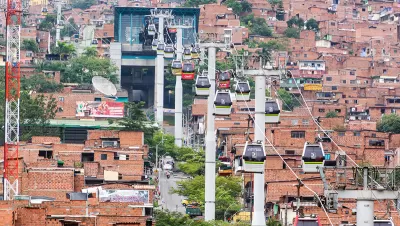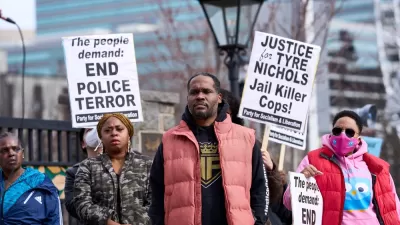A natural experiment in Medellín indicates that infrastructural investments can reduce crime and improve perceptions of public safety.

Writing in Streetsblog Chicago, Courtney Cobbs describes a 2012 analysis of how the built environment can affect violence and societal trust in Medellín, Colombia, and the lessons it provides for U.S. cities like Chicago. The study compared two neighborhoods, one that received infrastructure improvements and one that did not, to see how those improvements affected crime rates and community trust.
As part of the city's development plan, Medellín installed a network of gondolas known as Metrocable, which shuttle residents up and down the city's steep hillsides. In neighborhoods served by Metrocable, the government also installed "additional lighting for public spaces; new pedestrian bridges and street paths; 'library parks' (combining a library building and parkland); new buildings for schools, recreational centers, and centers to promote microenterprises; more police patrols; and a family police station (focusing on the protection of women and children) next to a gondola station." In other words, the gondola was accompanied by a system of public amenities, supportive infrastructure, and social services.
In the research period of 2003 to 2012, homicide rates and perceived violence dropped in all of Medellín's neighborhoods, but dropped more sharply in the neighborhoods with the gondola and new amenities. According to Cobbs, "Belief that residents could have a positive impact on reducing crime, and look out for one another in their neighborhood, increased in the intervention group but stayed stable for the control group."
The results indicate that "people-centered" infrastructure investments, while not a silver bullet, can have an impact on public safety and social cohesion, and Cobbs calls for similar investments in Chicago's underserved South and West sides.
FULL STORY: Notes from Medellín: Can infrastructure investments help reduce interpersonal violence?

Alabama: Trump Terminates Settlements for Black Communities Harmed By Raw Sewage
Trump deemed the landmark civil rights agreement “illegal DEI and environmental justice policy.”

Planetizen Federal Action Tracker
A weekly monitor of how Trump’s orders and actions are impacting planners and planning in America.

The 120 Year Old Tiny Home Villages That Sheltered San Francisco’s Earthquake Refugees
More than a century ago, San Francisco mobilized to house thousands of residents displaced by the 1906 earthquake. Could their strategy offer a model for the present?

LA’s Tree Emergency Goes Beyond Vandalism
After a vandal destroyed dozens of downtown LA trees, Mayor Karen Bass vowed to replace them. Days later, she slashed the city’s tree budget.

Sacramento Leads Nation With Bus-Mounted Bike Lane Enforcement Cameras
The city is the first to use its bus-mounted traffic enforcement system to cite drivers who park or drive in bike lanes.

Seattle Voters Approve Social Housing Referendum
Voters approved a corporate tax to fund the city’s housing authority despite an opposition campaign funded by Amazon and Microsoft.
Urban Design for Planners 1: Software Tools
This six-course series explores essential urban design concepts using open source software and equips planners with the tools they need to participate fully in the urban design process.
Planning for Universal Design
Learn the tools for implementing Universal Design in planning regulations.
Ada County Highway District
Clanton & Associates, Inc.
Jessamine County Fiscal Court
Institute for Housing and Urban Development Studies (IHS)
City of Grandview
Harvard GSD Executive Education
Toledo-Lucas County Plan Commissions
Salt Lake City
NYU Wagner Graduate School of Public Service




























